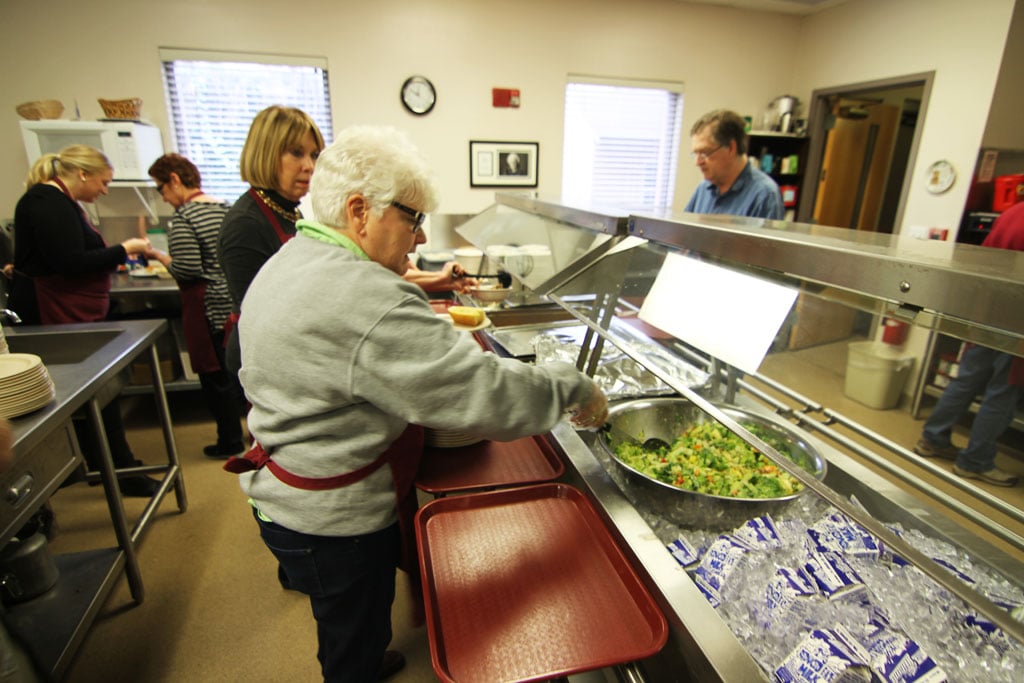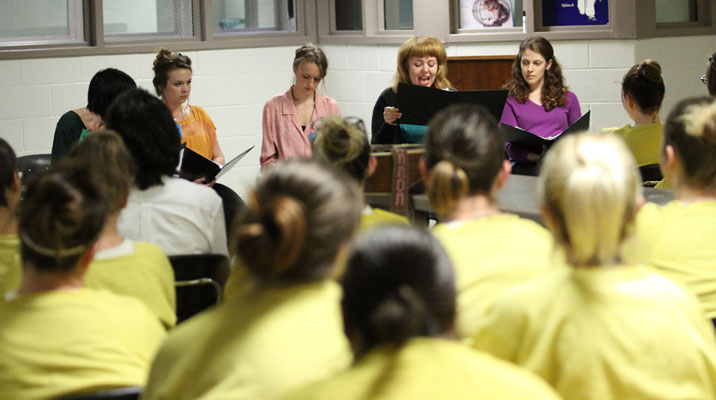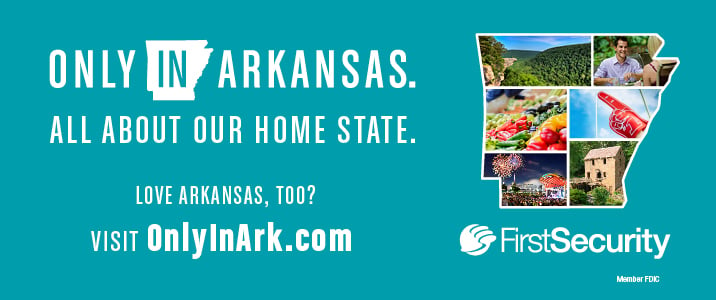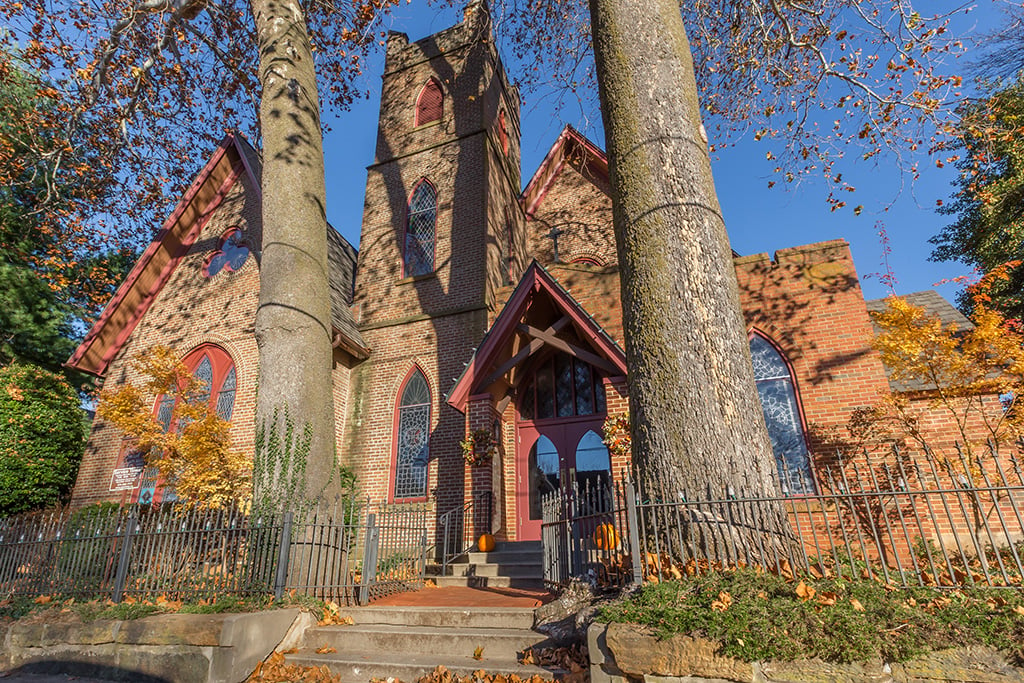
St. Paul’s Episcopal Church / Photo: Todd Gill, Flyer staff
For nearly 200 years, St. Paul’s Episcopal Church has been opening their doors for a lot more than just Sunday service in Fayetteville.
The church, which got its start at the corner of Meadow Street and College Avenue in the 1830s before moving to its current location at East Avenue and Dickson Street, has become a sort of unofficial community center for the downtown Fayetteville area.
It opens for at least five different Alcoholics Anonymous groups. Two Al-Anon Family groups have regular meetings there. There’s a support group and a day of respite offered for people with family members living with Alzheimer’s disease and dementia, a Rosen movement class, and at least three yoga classes that meet in the church that are free to attend and open to the public.
It hosts an annual Alternative Gift Market, Interfaith Harmony Day, and the sanctuary is frequently transformed into a beautiful backdrop for weddings and funerals for folks of many faiths.
The church has opened up as a rehearsal space for the orchestra when the Symphony of Northwest Arkansas is in town and preparing for a show. It hosts candidate forums around election season, and several times each year, performances are held for the Prison Story Project, a program that provides women in the Northwest Arkansas Community Correction Center an outlet for their stories through performances, theatre, poetry, and song.
And that’s just a small sample of the good that has come from 224 N. East Ave. over the years. There’s quite a bit more, actually.
A responsibility to serve
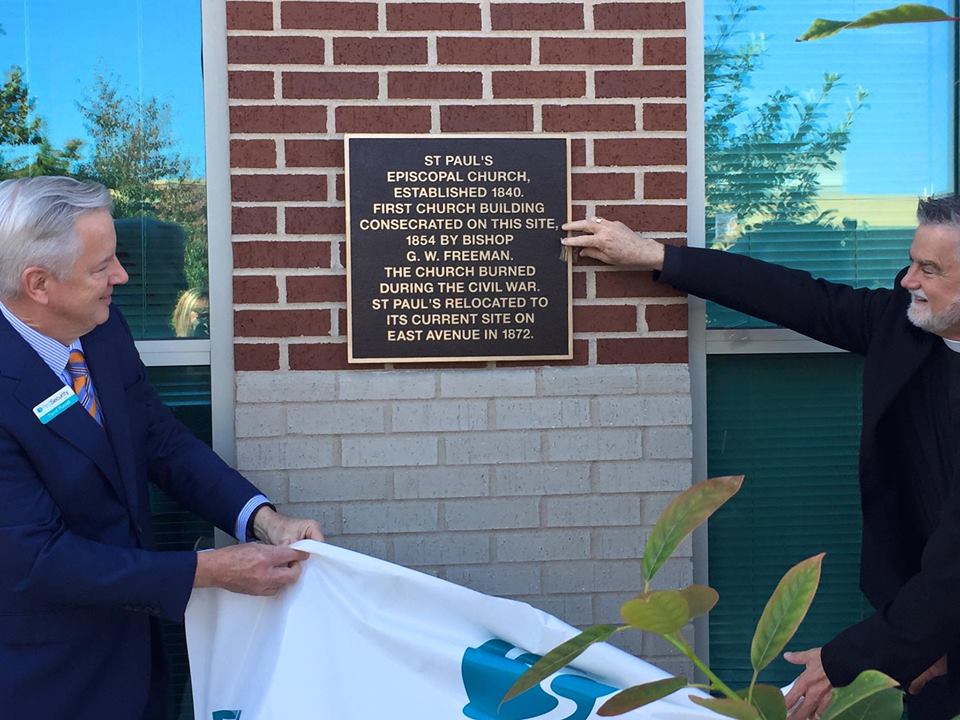
A plaque commemorating St. Paul’s original location was placed recently at First Security Bank’s 11 N. College Ave. location
Courtesy photo
St. Paul’s began, as best as Rector Lowell Grisham can tell, about 175 years ago.
“The records are a little ambiguous, but we believe we were organized as a parish either in 1839 or 1840,” he said. “We had our first church in 1854, down on the corner of College and Meadow where First Security Bank is now.”
That building eventually burned, and the church members met in homes and at the Masonic Lodge for a few years before relocating to their current location sometime in the early 1870s.
The church has a long history in Fayetteville, but the tendency to open its doors to the needs of the community goes back quite a bit farther.
The Episcopal Church is a descendent of the Church of England, where as the official, established church of the state, it was required to serve the entire community, not just church members.
“So that’s where that comes from,” he said. “We inherit some of the sense that we have responsibility to our neighbors whether they’re members or not.
“We host funerals for so many people that don’t have a church membership, or aren’t comfortable in any particular church,” he said.
Grisham said St. Paul’s embraces its role as “the church for folks who don’t go to church,” and tells the story of a new pastor that once moved to town and asked people on Dickson Street which local churches he should try to get the lay of the land.
“What he said he heard most often was, ‘Well, I don’t go to church, but if I did it would be St. Paul’s,'” Grisham said. “And we like that.”
Community Meals
In addition to opening their doors for meetings and other needs, St. Paul’s also opens up twice a week to serve community meals.
Every Monday and Wednesday, the church opens its parish hall to anyone who wants to come, and offers meals prepared in their kitchen by volunteers.
Lately, they’ve been serving around 1,200 meals per month to local men, women, and children, some of whom are homeless, and others who are simply struggling to put food on the table between paychecks.
The community meals were actually started by the nearby Methodist Church on Dickson Street, who began offering free meals on Tuesdays and Thursdays beginning in the mid-1990s.
Several St. Paul’s members began volunteering at the Methodist church, and after seeing the turnout, wanted to help fill the need for community meals on other days of the week.
St. Paul’s started serving meals on Monday and Wednesday around the time their new parish hall opened in 2002. Seven Hills Homeless center recently picked up Fridays, and now all five weekdays are covered for those who are hungry in Fayetteville.
In addition to serving lunch, St. Paul’s also sends food home with those who need a little extra help – a sandwich, usually – for dinner if requested.
The church gathers donations from local restaurants and food banks to create the meals, and then fills in the gaps with money from their own budget. They spend about $20,000-$30,000 annually on the program, which has grown exponentially over the years.
“When we started, it was around 35 people per day,” said Laura Wilkins, communications coordinator. “Then it got to 80 pretty regularly, then 100. I remember one year when we had 200 people at Christmas. Now, 200 is a regular day.”
Sewing seeds
Grisham said it has always been a mission of St. Paul’s to try to empower and encourage its members to go out and do some good in the community.
“Our line around here is ‘Everybody has a ministry. What’s yours?'” he said. “So when somebody sees a need that we can respond to, we try to give people the authority to do the work. We help them with networking. And we try to raise the money.
“Our job is to say ‘Yes’ whenever we can,” he said.
That mentality has led to a couple of programs that have become some of the most well-established non-profits in the region.
For example, the church partnered with St. Thomas Episcopal Church in Springdale to start St. Francis House, an organization that provided food, clothing, and shelter to those in need in 1989.
Shortly after that, the organization morphed into Community Clinic, a health care and dental clinic that offers affordable care to the uninsured living in the region. Community Clinic has since grown to operate 14 locations, staffed by 200 health care providers serving more than 90,000 office visits to patients over the last 15 years.
7 Hills Homeless Center, a local organization that strives to end the cycles of homelessness and poverty in Fayetteville, also began in Grisham’s office.
“Kimberly Gross came to me and shared some research she started for a social work class about the holes in the social fabric for the homeless here in Fayetteville,” Grisham recalled. “So she had a plan to start 7 Hills, and she pitched it to me, and I pitched it to John Lewis from Bank of Fayetteville, and he helped her create a business plan.
“Our vestry said yes, and we created it as a ministry of St. Pauls.”
A new project
Next up for St. Paul’s is a project they’re working on called Magdalene Serenity House of Northwest Arkansas.
The program sprouted out of the church’s involvement with the Prison Story Project, and through their other outreach efforts at the women’s correctional facility in Fayetteville.
Prison Story Project is a program started by local resident Kathy McGregor, who along with a team of poets, artists, storytellers, and musicians, spend 12 weeks with women from the prison, helping them to express their own stories in creative ways.
At the end of the program, performances are held at the prison and at St. Paul’s featuring local actors telling the real stories of the local inmates.
“Prison Story Project gave a profound voice to (the inmates),” Grisham said. “It helped us get to know them, and through that we saw women who were leaving the prison, who ended up back in the same places and problems that put them in the spiral they were in.
“And then one of the ladies that we had gotten to know ended up dead, and it was just breaking our heart,” he said.
McGregor introduced the church to the successful Magdalene House and Thistle Farms program out of Nashville, Tennessee, which provides 24 months of rent-free housing for 30 recovering women who are often victims of childhood sexual abuse, addiction, human trafficking and prostitution.
The program has a 17-year track record of helping 72 percent of the women in its program become clean and sober within 36 months.
“They’ve established a residential facility where women are welcomed and brought into their community, and given the kind of love that heals,” he said.
St. Paul’s has already filed to create a 501(c)(3) for the organization, formed a board of directors, and purchased a home for the local Magdalene Serenity House project. Renovations, expected to cost around $500,000, are also underway.
Once complete, officials plan to bring in a resident mentor – possibly a graduate from the Magdalene program in Nashville – who will live in the house to help establish a pattern of life and peer-to-peer recovery for the 5-8 women residing in the home.
The program will connect the women to existing support services, medical providers, and educational opportunities, and will team with local boutique Terra Tots to create a social enterprise business to employ the women and help develop their marketable skills. The women will work part-time in order to pay off court costs and fines, and begin to save for a life beyond Magdalene Fayetteville. The rest of their days will be structured with daily and weekly life skills activities such as budgeting and banking, meditation, yoga, book study, creative writing, job-related soft skills, resume preparation, and healthy eating.
“Our intention is to create a community where women who have survived these traumas can come and heal and find meaningful work and claim their lives,” Grisham said.
Those who’d like to support the project can make a pledge by visiting lovehealsnwa.org.

